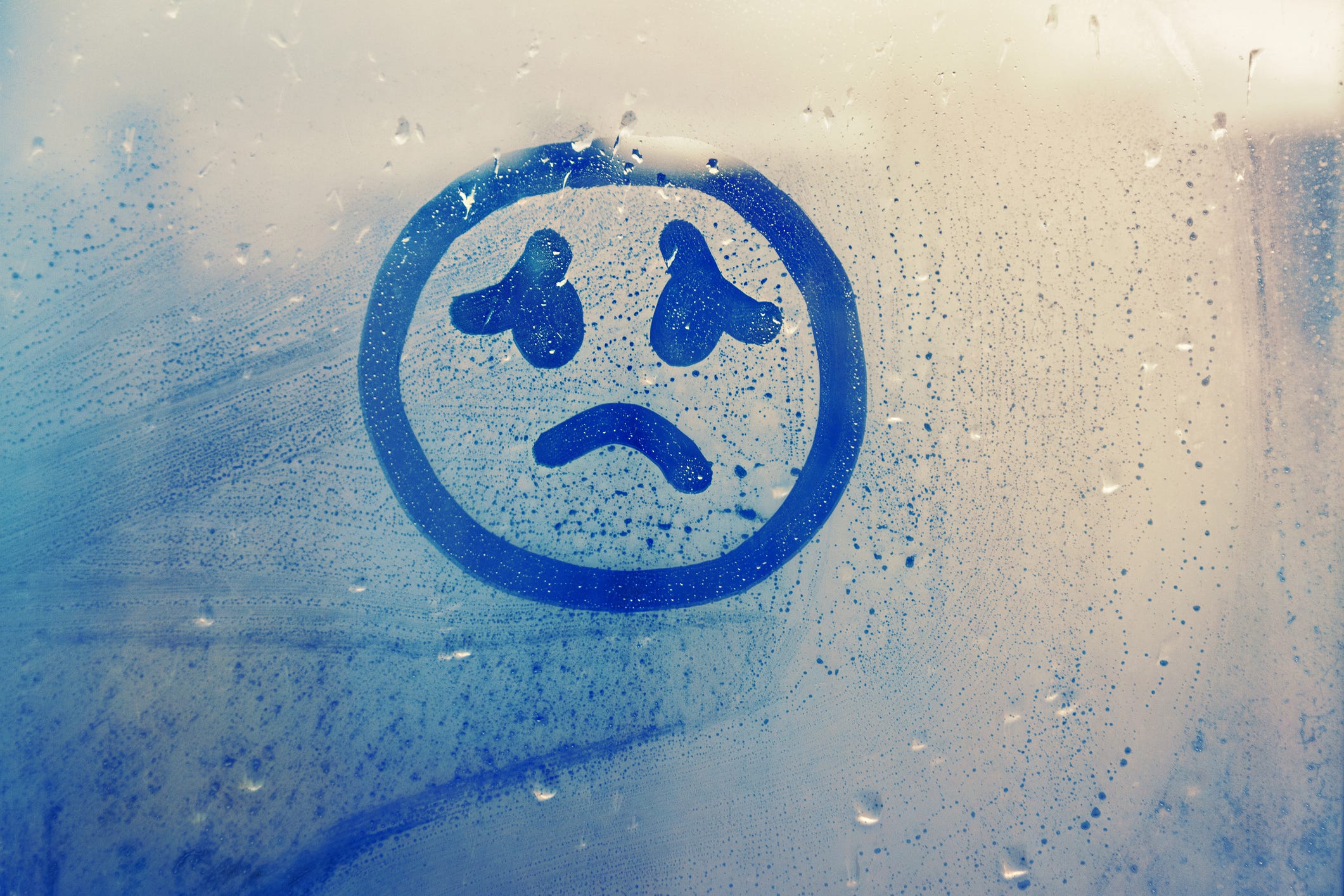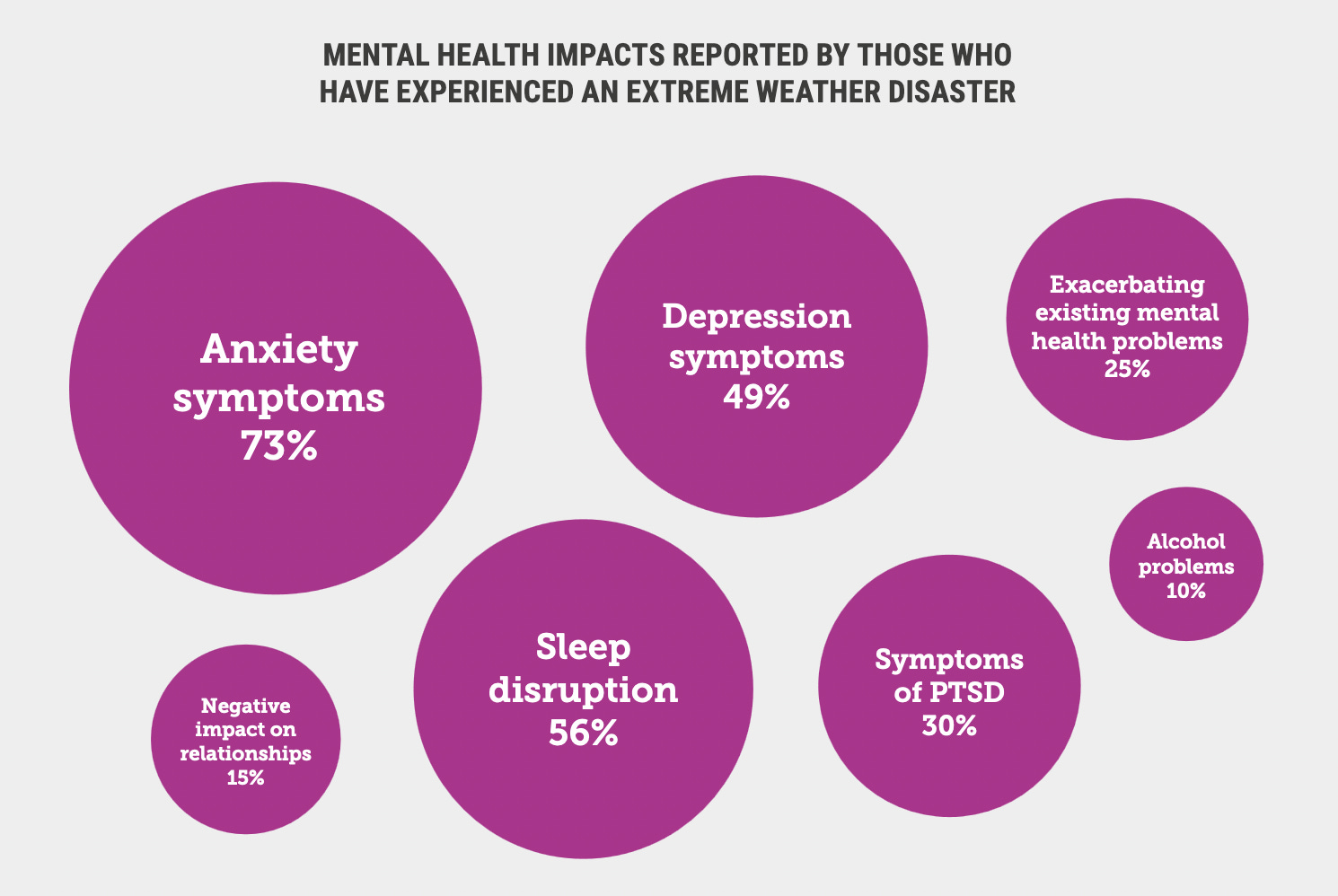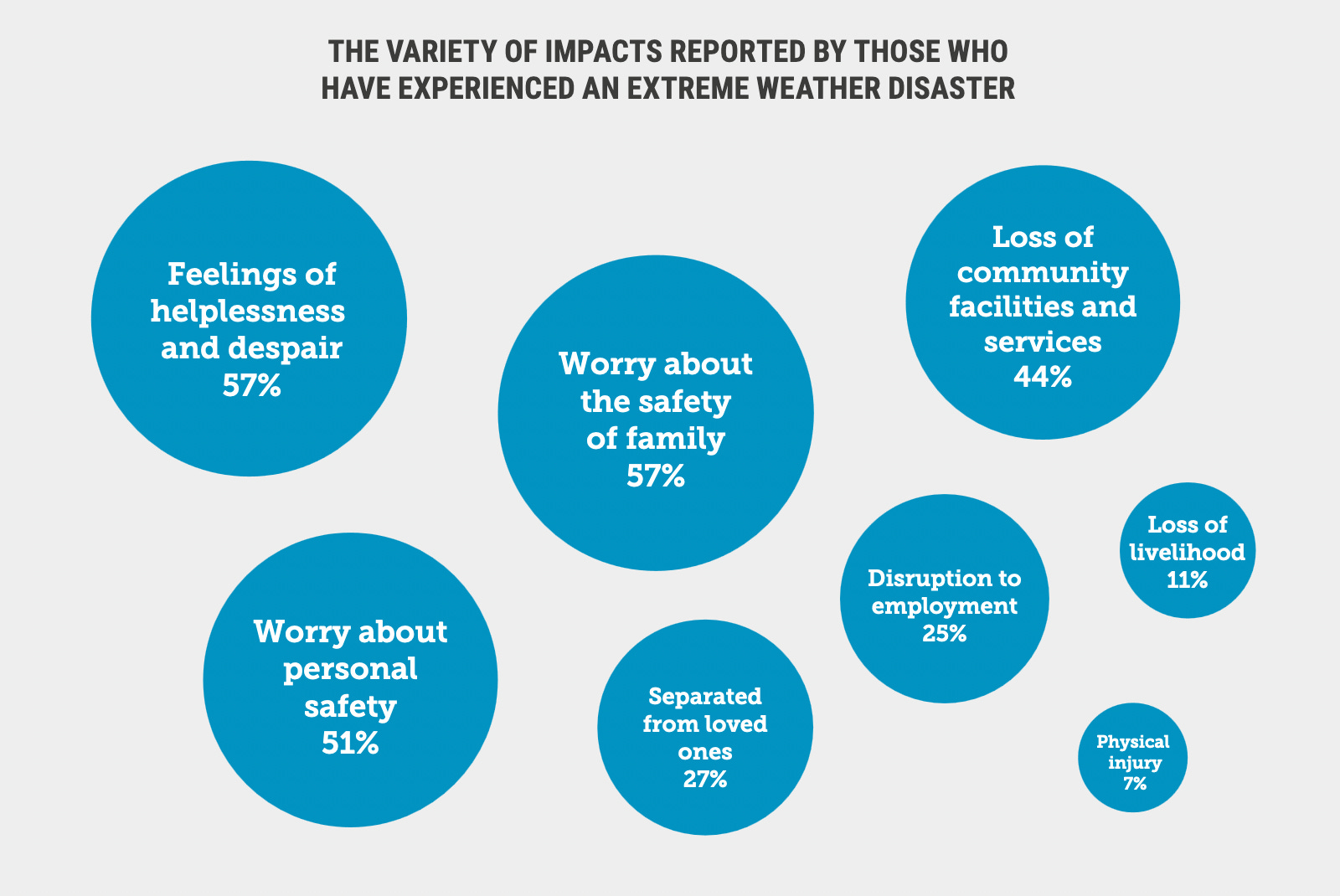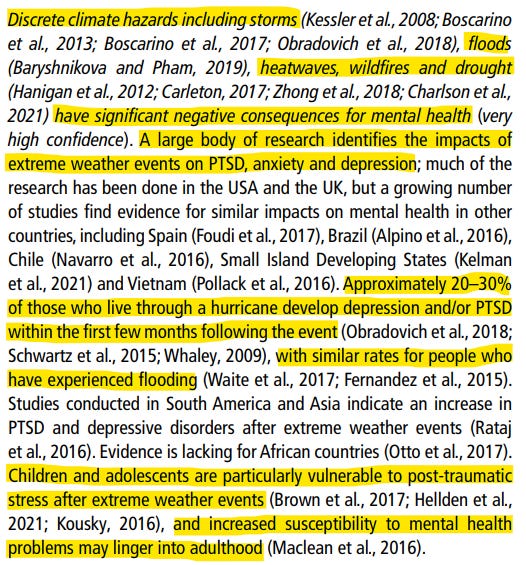HEATED - The hidden toll of climate disasters
Welcome back to HEATED—today’s newsletter written by me, Arielle Samuelson. If you appreciate our journalism, please consider keeping our lights on and our keyboards clacking with a paid subscription. Today’s article was inspired by a tweet thread by journalist Ajit Niranjan about how climate change impacts disaster survivors’ mental health. I wanted to explore what it means to live through climate trauma, versus simply worrying about it. Trigger warning for talk about anxiety, depression, and PTSD. If that’s not your cup of tea today, skip down to the bottom for mental health resources and two kittens snuggling. The hidden toll of climate disastersMost climate-related mental health challenges don’t come from “doom-and-gloom” rhetoric. They come from climate change itself.If you look around the news and social media, you’ll find that many discussions on climate change and mental health have focused on eco-anxiety, and the problem with doom-and-gloom rhetoric. Defined as "a chronic fear of environmental doom," eco-anxiety or climate anxiety has been documented to be on the rise, particularly among young people. As a result, “A growing number of researchers, activists and mental health professionals are now urging those in the climate movement to embrace more hope and adopt a softer tone,” according to Inside Climate News. Conversations like these have been welcome and necessary–especially because the notion that we’re “doomed” is just false. But new data indicates that, when it comes to mental health and climate change, it’s not enough to place the blame on “tone.” Because a striking number of people experiencing climate-related mental health challenges are not reacting to fear of the future. They’re reacting to the trauma of the present. The rise of “climate trauma”Earlier this year, the Climate Council of Australia released a national survey on the mental health impacts of living through climate-fueled weather disasters. The results were staggering. Not only did 80 percent of Australians report experiencing an extreme weather event since 2019; but nearly a third of those people reported symptoms of post-traumatic stress disorder because of it. An overwhelming 73 percent reported experiencing anxiety after living through a climate-fueled disaster. Almost half experienced depression. The reason for these mental health symptoms varied from financial to existential. “When there is a storm now and very heavy rain I feel anxious–panicky and stressed, hypervigilant, and also a sense of foreboding dread,” one Queensland resident told the Climate Council. Another anonymous parent said that, even with a raised home built to withstand floods, extreme flooding in Lismore, New South Wales killed their family pets and destroyed their house. “My life has completely changed, my son and I are still displaced with no hope in sight for what our future will become,” the parent said. These survey results add to an increasingly large body of evidence of the extreme mental health challenges of experiencing climate change. One study suggests that a whopping 30 to 40 percent of people who survive natural disasters develop PTSD. Some experts argue this phenomenon deserves its own term: “climate trauma.” The first study of the long-term effects of climate trauma found that disasters have long-term cognitive effects on survivors’ brains. Researchers found that survivors of California’s 2018 Camp Fire who suffered personal loss had higher levels of PTSD and depression than people who witnessed the event. In a follow-up study, published last month, the researchers found that the same group of people reporting climate trauma had more trouble processing information and making decisions, as well as chronic mental health problems—many years after the event. “How humans experience and mentally deal with climate catastrophes sets the stage for our future lives,” the study authors wrote.  for anybody not convinced this matters: here is a fairly brutal paragraph from the intergovernmental panel on climate change in their most recent summary of the peer-reviewed research 10/9 Climate anxiety alone is not a mental health disorderClimate anxiety experienced by those who haven’t lived through a climate disaster is no less real, and no less valid, than the climate anxiety experienced by those who have. Much of the research on mental health doesn’t differentiate between anxiety and depression caused by the news versus anxiety and depression caused by a natural disaster. Anxiety is anxiety, regardless of its origin. But the fact is, much of the climate anxiety we spend so much time trying to prevent, while distressing, is normal. Many experts don’t consider it a mental health disorder—rather, they say it is a reasonable emotional reaction to the real threat of climate change. This was cemented in a landmark study of 10,000 young people across the world, which found that 75 percent of people ages 18 to 25 think the future is frightening. That study mainstreamed the concept of climate anxiety. “One is to understand that it is a healthy and normal response to feel distressed about the climate crisis,” study author Britt Wray told Smithsonian Magazine. “It’s not a pathology. It’s not a mental health disorder. It’s a sign that you care and are attached to what’s going on in the world.” The PTSD, depression, and anxiety that often arise from experiencing climate trauma, however, are mental health disorders. And they deserve just as much, if not more, attention than the effects of scary headlines and social media—particularly because of the communities that are disproportionately suffering from it. The importance of mainstreaming climate traumaClimate anxiety and climate trauma can affect anyone. But it doesn’t impact every community equally. Many communities that report the highest level of climate anxiety are those who are disproportionately experiencing it, including Indigenous peoples, young people, and vulnerable communities around the world. This is something that the conversation about climate-related mental health issues often misses. “We very rarely find anyone talking about how people in Ghana or the Philippines feel about climate change,” University of Nottingham professor Charles Ogunbode told Grist. But these are the people most affected by climate anxiety. For example: in the study of 10,000 young people, those living in the Global South were most likely to report feeling frightened of the future, including Brazil (86 percent), India (80 percent), Nigeria (70 percent), and the Philippines (92 percent). People in countries that are poorer, or more directly impacted by climate change (like extreme wildfires in Portugal) also expressed more worry. The disproportionate effects go beyond anxiety, too. In India, which has been wracked by deadly heatwaves, a recent study found that people who experienced higher temperatures by only one degree Celsius had a 24 percent higher likelihood of both depression and anxiety. It’s not surprising that this inequity is felt in mental health; after all, those who contribute the least to climate change, including developing countries, are hit first and hardest. “These same patterns of inequity and injustice apply when it comes to the impacts upon mental wellbeing,” reports the Climate Council. This week’s newsletter was heavy, so I wanted to include some mental health resources at the end of it. I waded through many expert recommendations for climate anxiety, including joining a climate action group or taking nature walks. But I like science-backed solutions, and the scientific literature only points to two proven solutions: Find a community to share it with. Practice mindfulness. Resources:Many of these suggestions come from Britt Wray’s Resources for working with climate emotions, which I highly recommend reading for a full list. Below are a selected few: Mindfulness apps: Calm, Headspace, Insight Timer Group support resources:
Climate mental health groups: Further reading:
Catch of the Day: Today’s delightful distractions are courtesy of reader Mark, who sent us a baby picture of his Siamese(ish) cats Poppy (left) and Piper. These snuggle bugs love to climb up the back of the couch and looking out the window from their home in Maryland. Want to see your furry (or non-furry!) friend in HEATED? Send a picture and some words to catchoftheday@heated.world. You're currently a free subscriber to HEATED. For the full experience, upgrade your subscription. |
Older messages
Growing our climate choir
Tuesday, March 7, 2023
Thanks to your support, HEATED is expanding its reach to nearly a half million climate-concerned people on Instagram.
The world promised to phase out fossil fuel subsidies. Instead, it doubled them.
Thursday, March 2, 2023
The sharp rise in fossil fuel subsidies is just one example of why activists say climate treaties are so often meaningless.
Do fossil fuels have a place in the net zero transition?
Thursday, February 23, 2023
In our first edition of Wormhole, Arielle dives into a question that kept coming up in our previous story.
This is what they call "essential for life"
Tuesday, February 21, 2023
The environmental disaster in East Palestine, Ohio has everything to do with our dependence on fossil fuels.
These natural gas ads are full of hot air
Friday, February 17, 2023
Gas companies say their clean energy claims are backed by science. They fail to mention the science is fossil fuel funded.
You Might Also Like
What if 2025 was your best year yet?
Sunday, January 12, 2025
Or how I am trying to invite just a little more optimism into my life ͏ ͏ ͏ ͏ ͏ ͏ ͏ ͏ ͏ ͏ ͏ ͏ ͏ ͏ ͏ ͏ ͏ ͏ ͏ ͏ ͏ ͏ ͏ ͏ ͏ ͏ ͏ ͏ ͏ ͏ ͏ ͏ ͏ ͏ ͏ ͏ ͏ ͏ ͏ ͏ ͏ ͏ ͏ ͏ ͏ ͏ ͏ ͏ ͏ ͏ ͏ ͏ ͏ ͏ ͏ ͏ ͏ ͏ ͏ ͏ ͏ ͏ ͏ ͏ ͏ ͏
This Iconic Early 2000s Jewelry Trend Is Making A Comeback
Sunday, January 12, 2025
Go bold. The Zoe Report Daily The Zoe Report 1.11.2025 This Iconic Early 2000s Jewelry Trend Is Making A Comeback (Shopping) This Iconic Early 2000s Jewelry Trend Is Making A Comeback Go bold. Read
Looking for Better Sleep in 2025? Our Favorite Mattresses Are $300 Off Right Now
Saturday, January 11, 2025
If you have trouble reading this message, view it in a browser. Men's Health The Check Out Welcome to The Check Out, our newsletter that gives you a deeper look at some of our editors' favorite
You're Probably Checking Your 401(k) Too Often
Saturday, January 11, 2025
Think of New Habits As Skills. Staring at the number won't make it go up. Not displaying correctly? View this newsletter online. TODAY'S FEATURED STORY You're Probably Checking Your 401(k)
Love, Safety, and Connection in Times of Climate Distress
Saturday, January 11, 2025
Free Meditation ͏ ͏ ͏ ͏ ͏ ͏ ͏ ͏ ͏ ͏ ͏ ͏ ͏ ͏ ͏ ͏ ͏ ͏ ͏ ͏ ͏ ͏ ͏ ͏ ͏ ͏ ͏ ͏ ͏ ͏ ͏ ͏ ͏ ͏ ͏ ͏ ͏ ͏ ͏ ͏ ͏ ͏ ͏ ͏ ͏ ͏ ͏ ͏ ͏ ͏ ͏ ͏ ͏ ͏ ͏ ͏ ͏ ͏ ͏ ͏ ͏ ͏ ͏ ͏ ͏ ͏ ͏ ͏ ͏ ͏ ͏ ͏ ͏ ͏ ͏ ͏ ͏ ͏ ͏ ͏ ͏ ͏ ͏ ͏ ͏ ͏ ͏ ͏ ͏ ͏ ͏ ͏ ͏
Weekend: How to Tell Guests to Get a Hotel 🏨
Saturday, January 11, 2025
— Check out what we Skimm'd for you today January 11, 2025 Subscribe Read in browser Header Image But First: a hydrating, tinted lip treatment we love Update location or View forecast EDITOR'S
Dandori Time!
Saturday, January 11, 2025
Lessons from a video game ͏ ͏ ͏ ͏ ͏ ͏ ͏ ͏ ͏ ͏ ͏ ͏ ͏ ͏ ͏ ͏ ͏ ͏ ͏ ͏ ͏ ͏ ͏ ͏ ͏ ͏ ͏ ͏ ͏ ͏ ͏ ͏ ͏ ͏ ͏ ͏ ͏ ͏ ͏ ͏ ͏ ͏ ͏ ͏ ͏ ͏ ͏ ͏ ͏ ͏ ͏ ͏ ͏ ͏ ͏ ͏ ͏ ͏ ͏ ͏ ͏ ͏ ͏ ͏ ͏ ͏ ͏ ͏ ͏ ͏ ͏ ͏ ͏ ͏ ͏ ͏ ͏ ͏ ͏ ͏ ͏ ͏ ͏ ͏ ͏ ͏ ͏ ͏
“Winter Night” by Amos Wilder
Saturday, January 11, 2025
O magical the winter night! Illusory this stretch / Of unimaginable grays January 11, 2025 donate Winter Night Amos Wilder O magical the winter night! Illusory this stretch Of unimaginable grays; so
Anne Hathaway Just Shut It Down In A Princess-Like Oscar de la Renta Gown
Saturday, January 11, 2025
She's sure to start a trend. The Zoe Report Daily The Zoe Report 1.10.2025 Anne Hathaway Just Shut It Down In A Princess-Like Oscar de la Renta Gown (Celebrity) Anne Hathaway Just Shut It Down In A
The Difference Between Cleaning, Disinfecting, and Sanitizing
Friday, January 10, 2025
The Best Products We Saw at CES 2025 Cleaning doesn't necessarily sanitize, and sanitizing doesn't necessarily disinfect. Here's the difference and when you need each. Not displaying





